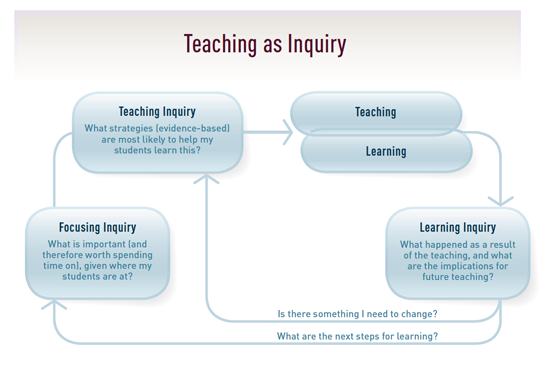Teaching as inquiry
Effective pedagogy requires that teachers inquire into the impact of their teaching on their students (The New Zealand Curriculum, p. 35).
Within this inquiry process, teachers will define the most important learning for their students (the focusing inquiry), the best strategies to use when teaching (the teaching inquiry), and the outcomes for students (the learning inquiry).
Many approaches that will inform these inquiries have been described and illustrated in the previous pedagogy sub-sections.

NZC_Teaching as inquiry diagram
If you cannot view or read this diagram, select this link to open a text version.
Learn more:
TOP
Three inquiries
Focusing inquiry
What is important (and therefore worth spending time on) given where my students are at?
Teachers will
find out about their students, including their interests, goals, and aspirations; what the students have already learned; and what is important to them. They will prioritise learning based on:
- the accounting learning objectives
- information gathered about students’ existing knowledge and skills
- an estimation of what will support their future learning and their ability to contribute to their communities
- the concepts, big ideas, and academic vocabulary that need to be introduced or reinforced.
Teaching inquiry
What strategies (evidenced-based) will help my students learn this?
Teachers will:
- use strategies that have been successful in the past
- investigate and try new strategies that have been shown to be successful (by colleagues, students, professional learning, or research)
- use contexts that will help students discover and explore the big ideas of accounting.
Learning inquiry
What happened as a result of this teaching and what are the implications for future teaching?
The effectiveness of the strategies used to this point will be determined by what the students have learned. Teachers could:
- use
formative assessment methods to monitor student progress and understanding, during and after learning
- assess students’ achievement against the specified outcomes and analyse the assessment data to identify groups or individuals for whom the teaching strategies have not worked, including meeting with these groups to unpack any issues they have identified
- build in observations of teaching practice to check on the success or otherwise of teaching strategies, including interviewing students about their understanding of the intended learning, the relevance of this learning to them, and the effectiveness of the teaching strategies from their perspective
-
encourage students to provide feedback on the teaching and their learning through open in-class discussion, via anonymous responses on Survey Monkey or short 'exit cards' contributed at the end of a class or unit, or as part of a self-assessment and reflection process during or at the end of a unit
- establish next steps for students’ learning, for example, discussing which concepts or big ideas need to be reinforced or introduced next and different contexts through which students can further explore these big ideas
- discuss other possible strategies that could be used to meet learning needs.
<Back to pedagogy
Last updated August 13, 2013
TOP


